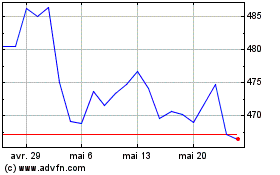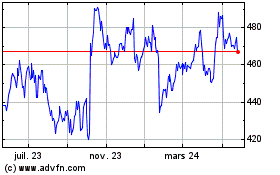Boeing Says Caret to Replace Chadwick as Defense Unit's Chief -- 2nd Update
25 Février 2016 - 1:31AM
Dow Jones News
By Doug Cameron
Boeing Co. announced the sudden retirement of Chris Chadwick as
head of its defense-and-space unit after just over two years
leading the $30 billion-a-year business.
The aerospace giant on Wednesday said that Leanne Caret, 49
years old, a company veteran who currently heads Boeing's logistics
business, will replace Mr. Chadwick on March 1. The company gave
little reason for the departure of Mr. Chadwick, 55, saying only
that he is eligible for retirement and plans to leave the company
later this spring.
"He believes the business is on a solid, stable footing, and his
retirement allows his successor to build on that foundation and
pursue upcoming growth opportunities," said a spokesman. Boeing
declined to make Mr. Chadwick available.
Boeing hadn't previously telegraphed any plans to change senior
management at its defense arm. Mr. Chadwick, who previously led the
company's military-aircraft arm, has headed the St. Louis-based
defense-and-space segment since December 2013, replacing Dennis
Muilenburg, who is now Boeing's chief executive. The company
announced this week that Mr. Muilenburg also would assume the
chairman's role when predecessor Jim McNerney retires at the end of
this month.
Ms. Caret, who joined Boeing in 1988, becomes one of several
women running major U.S. defense businesses, including Lockheed
Martin Corp. CEO Marillyn Hewson and Phebe Novakovic, her
counterpart at General Dynamics Corp.
Ms. Caret has previously served as chief financial officer of
the defense unit and run its helicopter operation. Her appointment
was approved by the Boeing board at a meeting over the weekend, the
company said.
Boeing's defense business has remained solidly profitable
despite Pentagon spending cuts in recent years, and margins
increased following restructuring that included thousands of job
cuts. But the unit also has suffered some recent setbacks.
Last year Boeing lost out to Northrop Grumman Corp. after a
hard-fought, yearslong contest to build a new long-range strike
bomber fleet for the U.S. Air Force, a program that analysts
estimate could eventually be worth more than $80 billion.
Boeing has another big Pentagon contract to build new refueling
tankers for the Air Force. That project suffered design and
technical problems that delayed its first flight and triggered $1.2
billion in pretax write-offs against Boeing's earnings, though the
company has said the program is now on track.
Boeing and its partner on the bomber bid, Lockheed Martin,
lodged a protest over the decision, but the Government
Accountability Office last week turned it down. Analysts said
Boeing could still opt to take the Pentagon to court in an effort
to reopen the contest.
The bomber was one of a small number of significant
opportunities for Boeing to win new big-ticket Pentagon contracts.
Others include the new T-X trainer jet, a proposed Navy drone and
the JSTARS surveillance plane. Boeing also is looking for
additional work against the backdrop of declining orders for its
existing combat jet lineup, including the F-15 and the F/A-18.
Write to Doug Cameron at doug.cameron@wsj.com
(END) Dow Jones Newswires
February 24, 2016 19:16 ET (00:16 GMT)
Copyright (c) 2016 Dow Jones & Company, Inc.
Northrop Grumman (NYSE:NOC)
Graphique Historique de l'Action
De Juin 2024 à Juil 2024

Northrop Grumman (NYSE:NOC)
Graphique Historique de l'Action
De Juil 2023 à Juil 2024
